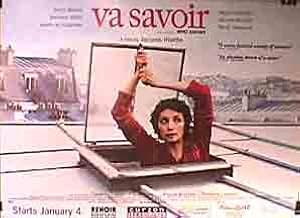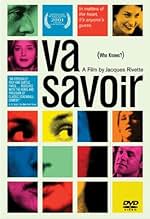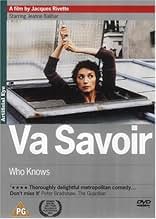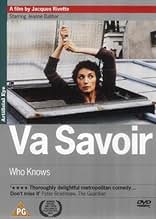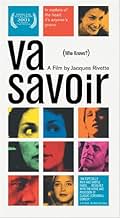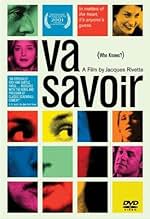Va savoir
- 2001
- Tous publics
- 2h 34min
NOTE IMDb
6,8/10
2,6 k
MA NOTE
Ajouter une intrigue dans votre langueQuick-witted, well-read cultured types revolve around each other in a delightful potpourri of theatre, romanticism and theft.Quick-witted, well-read cultured types revolve around each other in a delightful potpourri of theatre, romanticism and theft.Quick-witted, well-read cultured types revolve around each other in a delightful potpourri of theatre, romanticism and theft.
- Réalisation
- Scénario
- Casting principal
- Récompenses
- 3 victoires et 3 nominations au total
Valeria Cavalli
- Ines
- (as Valéria Cavalli)
Avis à la une
A light Rivette; Va Savoir (2001) is a film that features many of the director's most recognisable traits and characteristics familiar from the unwieldy and progressive films that he made in the late 1960's and early 1970's, but done in such a way as to suggest a more frivolous or throwaway tone with the emphasis placed more squarely on the elements of comedy and farce. This doesn't necessarily mean that the film is bad, or that it fails in some way to compare to the more iconic likes of Paris nous appartient (1960), L'amour fou (1969), Out 1 (1971) and Celine and Julie Go Boating (1974) - all of which are referenced here - but rather, that it shows a process of simplification; with Rivette taking his chosen themes - such as performance, miscommunication and the battle of the sexes - and allowing the characters to take precedence over the story, as opposed to the experiments with the film-making form. Perhaps this is emblematic of Rivette's more recent work over the last twenty years, though having only seen La Belle Noiseuse (1991) from his post Celine and Julie projects (admittedly missing out on a great deal of the man's career), I can only make the obvious comparisons.
Nonetheless, the relative simplicity and emphasis on character worked well here; with Rivette keenly following the trials and tribulations of a small collection of characters all bumbling about the woes of modern relationship difficulties from an upper-middle class perspective. Along the way we have the usual self-reflexive comments on the nature of performance and of film-making itself, with the story revolving around an Italian-language production of Luigi Pirandello's "As You Desire Me" that the central couple are appearing in. In some respects the film reminded me of the work of Woody Allen, with the ensemble nature of the narrative and the film's social milieu suggesting elements of Hannah and her Sisters (1986), Husbands and Wives (1994) and the more recent Melinda and Melinda (2004), while the idea of a play (or film) that is both a part of the story and also a subtle comment on it reminded me of Stardust Memories (1980), The Purple Rose of Cairo (1984) and Bullets Over Broadway (1994). As with those particular films, Va Savoir offers a narrative in which the subtle juxtaposition of the characters thoughts, feelings and social interactions creates a comedy of errors to undercut many of the more dramatic or self-consciously self-reflexive elements of the film.
As ever with Rivette - or at least the work of his that I've so far seen - the film moves perfectly between the various characters and their roles and interactions, as the skillful sense of choreography between the different layers of the narrative and the impeccable comic-performances of the cast help to draw us in to the story and lead us towards that quietly brilliant final act. I can certainly understand why many would dislike the film; it's long, deals exclusively in character interaction (on at least two separate levels) and creates a world that is stuffy and intellectual, no doubt seemingly horribly pretentious to those unwilling to spend more than thirty minutes with these characters or the world that Rivette creates. Regardless, I personally think that Va Savoir is a fine film; both intelligent and entertaining and with that spark and spirit so recognisable in the director's work from Paris nous appartient to the celebrated Celine and Julie.
Nonetheless, the relative simplicity and emphasis on character worked well here; with Rivette keenly following the trials and tribulations of a small collection of characters all bumbling about the woes of modern relationship difficulties from an upper-middle class perspective. Along the way we have the usual self-reflexive comments on the nature of performance and of film-making itself, with the story revolving around an Italian-language production of Luigi Pirandello's "As You Desire Me" that the central couple are appearing in. In some respects the film reminded me of the work of Woody Allen, with the ensemble nature of the narrative and the film's social milieu suggesting elements of Hannah and her Sisters (1986), Husbands and Wives (1994) and the more recent Melinda and Melinda (2004), while the idea of a play (or film) that is both a part of the story and also a subtle comment on it reminded me of Stardust Memories (1980), The Purple Rose of Cairo (1984) and Bullets Over Broadway (1994). As with those particular films, Va Savoir offers a narrative in which the subtle juxtaposition of the characters thoughts, feelings and social interactions creates a comedy of errors to undercut many of the more dramatic or self-consciously self-reflexive elements of the film.
As ever with Rivette - or at least the work of his that I've so far seen - the film moves perfectly between the various characters and their roles and interactions, as the skillful sense of choreography between the different layers of the narrative and the impeccable comic-performances of the cast help to draw us in to the story and lead us towards that quietly brilliant final act. I can certainly understand why many would dislike the film; it's long, deals exclusively in character interaction (on at least two separate levels) and creates a world that is stuffy and intellectual, no doubt seemingly horribly pretentious to those unwilling to spend more than thirty minutes with these characters or the world that Rivette creates. Regardless, I personally think that Va Savoir is a fine film; both intelligent and entertaining and with that spark and spirit so recognisable in the director's work from Paris nous appartient to the celebrated Celine and Julie.
The play within a play ploy is used in Go Figure to excellent effect. The play is an eighteenth century farce performed by an Italian acting troupe visiting Paris. The farce utilizes six characters, the optimal number to engage in romantic mix-ups, flirtations, and other amorous stuff. And lo and behold, Go Figure itself contains six persons who engage in romantic mix-ups, flirtations, and crimes, both physical and of the heart.
There's the lead actress and her stage manager husband; she, who walked out on her now married ex-lover, whom she meets for the first time in three years (as well as his wife). Rounding out the six are two siblings, one a sexy young lady, the other her caddish older brother. There's jewel theft, a hunt for a missing manuscript, jealousy, and the falling in and out of love. And in the backdrop the acting troupe struggles to remains solvent.
All this is served up in, what I would call a French style. Of course I've not seen that many French romantic comedies, but I can state that were this in the hands of an American 'Hollywood' director it would be an entirely different film. And probably not nearly as good. In Rivette's hands all the action and interactions seem natural and light. There's no 'look at me' style of acting; it's almost understated. And this makes for a very enjoyable viewing that loses little on the small screen.
There's the lead actress and her stage manager husband; she, who walked out on her now married ex-lover, whom she meets for the first time in three years (as well as his wife). Rounding out the six are two siblings, one a sexy young lady, the other her caddish older brother. There's jewel theft, a hunt for a missing manuscript, jealousy, and the falling in and out of love. And in the backdrop the acting troupe struggles to remains solvent.
All this is served up in, what I would call a French style. Of course I've not seen that many French romantic comedies, but I can state that were this in the hands of an American 'Hollywood' director it would be an entirely different film. And probably not nearly as good. In Rivette's hands all the action and interactions seem natural and light. There's no 'look at me' style of acting; it's almost understated. And this makes for a very enjoyable viewing that loses little on the small screen.
I was bored to death by this movie. The main character is a self-centered and selfish actress whose problems failed to interest me. I stayed with it for an hour, and walked away; my wife said it became somewhat better toward the end. If all drama must be divided into comedy and tragedy, then in that sense this is a comedy. However, when movie reviewers call a movie a comedy, I think we are entitled to believe they mean it is funny. Tastes differ, and I accept that some might find this movie interesting, but by no stretch of the imagination could anyone in his right mind call it "funny." I wouldn't have rented this video except for a quotation on the box, in which A. O. Scott of The New York Times wrote, "An especially rich and subtle farce . . . resolved with the verve and precision of classic screwball comedy."
I felt I should like this film more than I did. It is set in current day Paris where a theatre troupe is putting on a Italian production. The story revolves around a French actress in the troupe who is married to the director of the theatre group who is returning to Paris for the first time in years and still has unresolved feelings for an ex who resides in the city. The acting is solid if not very good, and the plot does hold interest and hangs together well. Having said this I could not help but feel the whole thing was somewhat slight and the payoff in time (it is or seemed like a very long movie) was somewhat unjustified. In some ways the characters seemed almost distant to me, they were real but I couldnt get inside their head, which in some ways is a silly criticism because life is like that and that is not necessarily a detraction for the film but I felt as though they were drifting through a series of set pieces with not all that much at stake. Having said this it is definitely worth a look and certainly should be sought if you enjoy cinema that goes beyond the pedestrian plot lines and pyrotechnics of all too many mainstream features today.
The only time I felt anything for one of the characters here was near the beginning, when Camille, the lead actor in a Parisian production of a Pirandello play, a French woman speaking in Italian, has trouble remembering her lines (she is pre-occupied by a past love affair which had taken place in that city). The rest of the time I was either mildly amused, or just bored. It is hard to find empathy with a group who seem to be as artificial off the stage as they are on it. There are some nice moments, especially when Ugo fends off temptation from the lovely Dominique, and the duel scene between Ugo and the prat of a philosopher who was once his partner Camille's lover, but the whole thing takes far too long (2 hours 20 minutes), lacks tension and above all calls for minimal involvement on the part of the viewer.
It's rather interesting that Ugo is searching for an unpublished 18th century play. If theatre is to avoid being relegated to museums, producers need either to put on new stuff, or at least to present old material in an innovative way. Ugo seems to regard the past as more important than the future (a pointer, perhaps to the age of the director here).
The atmosphere here reminded me of `Amelie'. Both films have popped up at various film festivals around the world as examples of current French film production. If they are typical, then you might think the French film industry is headed for irrelevancy, but the Marseilles films of Robert Guediguian fortunately suggest otherwise.
It's rather interesting that Ugo is searching for an unpublished 18th century play. If theatre is to avoid being relegated to museums, producers need either to put on new stuff, or at least to present old material in an innovative way. Ugo seems to regard the past as more important than the future (a pointer, perhaps to the age of the director here).
The atmosphere here reminded me of `Amelie'. Both films have popped up at various film festivals around the world as examples of current French film production. If they are typical, then you might think the French film industry is headed for irrelevancy, but the Marseilles films of Robert Guediguian fortunately suggest otherwise.
Le saviez-vous
- AnecdotesSergio Castellitto dubbed himself in the french version, while Jeanne Balibar dubbed herself in the italian's.
- GaffesA child and a bicycle in the background disappears between shots in the park.
- Citations
Cammille B.: I really should calm down. I knew this would happen. It was coming. I should have said no, not a chance, not Paris. Even three years later, I can't.
- Versions alternativesRivette's original 220 minute cut called Va Savoir+ premiered on 24 April 2002 and ran for seven weeks at only one theater, the Cinéma du Pantheon in Paris, selling a total of 1,734 tickets. Rivette said that Va Savoir+ was a completely different film than Va Savoir, the major difference being lengthy scenes of the actors performing Pirandello's "Come tu mi vuoi" instead of just rehearsals. The director stated that in the longer version, Pirandello's play is "another character" in the film.
- ConnexionsFeatured in Tempus fugit, manet amor: Jacques Rivette à propos de Va savoir (2008)
Meilleurs choix
Connectez-vous pour évaluer et suivre la liste de favoris afin de recevoir des recommandations personnalisées
- How long is Who Knows??Alimenté par Alexa
Détails
- Date de sortie
- Pays d’origine
- Site officiel
- Langues
- Aussi connu sous le nom de
- Va savoir+
- Lieux de tournage
- Sociétés de production
- Voir plus de crédits d'entreprise sur IMDbPro
Box-office
- Montant brut aux États-Unis et au Canada
- 907 323 $US
- Week-end de sortie aux États-Unis et au Canada
- 43 010 $US
- 30 sept. 2001
- Montant brut mondial
- 2 039 644 $US
- Durée2 heures 34 minutes
- Couleur
- Mixage
- Rapport de forme
- 1.85 : 1
Contribuer à cette page
Suggérer une modification ou ajouter du contenu manquant

Lacune principale
By what name was Va savoir (2001) officially released in Canada in English?
Répondre






